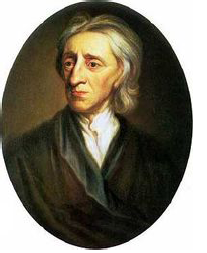John Locke (1632–1704) was an English philosopher, often classified as an ‘empiricist’, because he believed that knowledge was founded in empirical observation and experience.

All ideas come from sensation or reflection.
Let us then suppose the mind to be, as we say, white paper, void of all characters, without any ideas: How comes it to be furnished? Whence comes it by that vast store which the busy and boundless fancy of man has painted on it with an almost endless variety? Whence has it all the materials of reason and knowledge? To this I answer, in one word, from EXPERIENCE. In that all our knowledge is founded; and from that it ultimately derives itself. Our observation employed either, about external sensible objects, or about the internal operations of our minds perceived and reflected on by ourselves, is that which supplies our understandings with all the materials of thinking. These two are the fountains of knowledge, from whence all the ideas we have, or can naturally have, do spring.
The objects of sensation one source of ideas.
First, our Senses, conversant about particular sensible objects, do convey into the mind several distinct perceptions of things, according to those various ways wherein those objects do affect them. And thus we come by those ideas we have of yellow, white, heat, cold, soft, hard, bitter, sweet, and all those which we call sensible qualities; which when I say the senses convey into the mind, I mean, they from external objects convey into the mind what produces there those perceptions. This great source of most of the ideas we have, depending wholly upon our senses, and derived by them to the understanding, I call SENSATION.
The operations of our minds, the other source of them.
Secondly, the other fountain from which experience furnisheth the understanding with ideas is the perception of the operations of our own mind within us, as it is employed about the ideas it has got … And such are perception, thinking, doubting, believing, reasoning, knowing, willing, and all the different actings of our own minds … I Call this REFLECTION, the ideas it affords being such only as the mind gets by reflecting on its own operations within itself. By reflection then … I would be understood to mean, that notice which the mind takes of its own operations, and the manner of them, by reason whereof there come to be ideas of these operations in the understanding. These two, I say, viz. external material things, as the objects of SENSATION, and the operations of our own minds within, as the objects of REFLECTION, are to me the only originals from whence all our ideas take their beginnings …
Observable in children.
He that attentively considers the state of a child, at his first coming into the world, will have little reason to think him stored with plenty of ideas, that are to be the matter of his future knowledge … I think it will be granted easily, that if a child were kept in a place where he never saw any other but black and white till he were a man, he would have no more ideas of scarlet or green, than he that from his childhood never tasted an oyster, or a pine-apple, has of those particular relishes … Follow a child from its birth, and observe the alterations that time makes, and you shall find, as the mind by the senses comes more and more to be furnished with ideas, it comes to be more and more awake; thinks more, the more it has matter to think on. After some time it begins to know the objects which, being most familiar with it, have made lasting impressions. Thus it comes by degrees to know the persons it daily converses with, and distinguishes them from strangers; which are instances and effects of its coming to retain and distinguish the ideas the senses convey to it …
In time the mind comes to reflect on its own operations about the ideas got by sensation, and thereby stores itself with a new set of ideas, which I call ideas of reflection. These are the impressions that are made on our senses by outward objects that are extrinsical to the mind; and its own operations, proceeding from powers intrinsical and proper to itself, which, when reflected on by itself, become also objects of its contemplation … Thus the first capacity of human intellect is that the mind is fitted to receive the impressions made on it; either through the senses by outward objects, or by its own operations when it reflects on them. This is the first step a man makes towards the discovery of anything, and the groundwork whereon to build all those notions which ever he shall have naturally in this world. All those sublime thoughts which tower above the clouds, and reach as high as heaven itself, take their rise and footing here: in all that great extent wherein the mind wanders, in those remote speculations it may seem to be elevated with, it stirs not one jot beyond those ideas which sense or reflection have offered for its contemplation.
Locke, John. 1690. An Essay Concerning Human Understanding. Book II, Chapter 1: 1. Book I, Chapter 1: 1. Book II, Chapter 1: 2, 3, 4, 6, 22, 24. || Amazon || WorldCat
